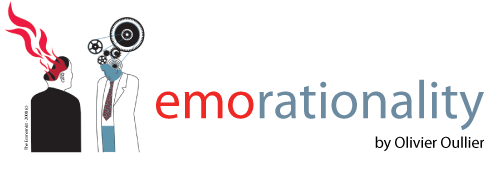We have a new book chapter published in "Neuroeconomics and the firm" a book edited by Angela Stanton, Mellani Day and Isabell Welpe (browse the book here and download our chapter here).
This is what Nobel Laureate Vernon Smith wrote about the book:
 "This volume brings together leading researchers from a variety of fields to investigate the concept of the firm from new perspectives arising from neuroeconomics. The traditional theory of the firm has focused on the strategic, operational and resource management objectives of the firm as an organization. This timely and informative book explores new horizons in the biology of human decision-making and behavior, including uncertainty, entrepreneurship and ethics as it affects the functioning of the organization.
"This volume brings together leading researchers from a variety of fields to investigate the concept of the firm from new perspectives arising from neuroeconomics. The traditional theory of the firm has focused on the strategic, operational and resource management objectives of the firm as an organization. This timely and informative book explores new horizons in the biology of human decision-making and behavior, including uncertainty, entrepreneurship and ethics as it affects the functioning of the organization. 


